"Teachings on the Weser." How Hitler captured Denmark and Norway
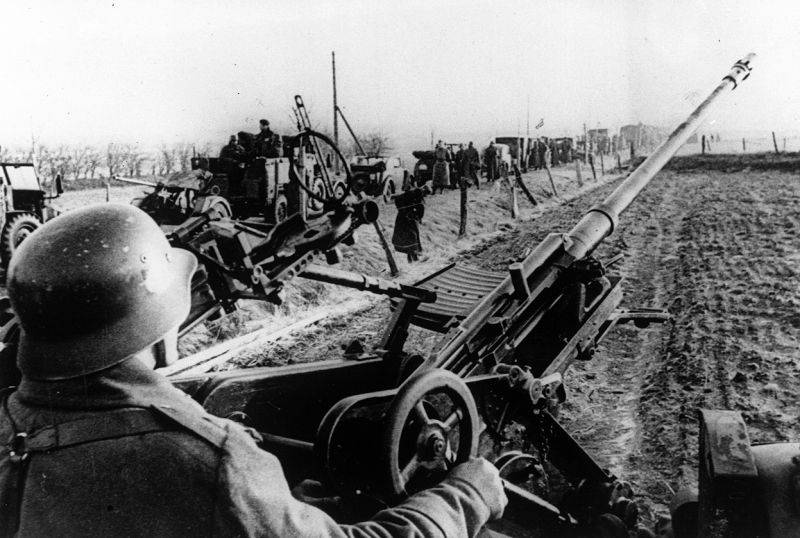
German anti-aircraft gunner covers troops participating in the Wehrmacht invasion of Denmark in April 1940
80 years ago, on April 9, 1940, the German invasion of Denmark and Norway began (Danish-Norwegian operation, or Operation Weserubung; “Teachings on Weser” or “Weser Maneuvers”). The Wehrmacht occupied Denmark and Norway, strengthening the strategic position of the Third Reich in Northern Europe.
General situation
After the defeat and occupation of Poland, the Third Reich began preparations for an invasion of the West. Hitler was not going to repeat the mistakes of the Kaiser. Before the war with Russia, he was going to defeat France and England, to take revenge on the French. England and France at that time pursued a “strange war” policy, abandoning active operations against Germany, although its military and economic potential was relatively weak and the Allies had good chances to defeat the Germans. London and Paris still hoped that Hitler would go to war with the Russians first.
As a result, the situation was favorable for Germany. The Reich leadership received time to prepare a new aggression and choose the beginning of a new offensive. The strategic initiative by the Anglo-French leadership was calmly transferred to Hitler. Already in late September - early October 1939, Hitler ordered the preparation of an offensive against France to be included in the Netherlands and Belgium in the combat zone. The Führer formulated the goal of the war: "Bring England to its knees, defeat France."
The stake in the war was on massive use tanks и aviation. To lightning war. The Reich could not wage a protracted war, as it had a limited raw material and food base. Moreover, the war in the West was only a stage in the development of world aggression. On November 23, 1939, speaking at a meeting with the military leadership, Hitler noted: "We can only oppose Russia after we are free in the West." Concentration and deployment of troops in the western strategic direction begins.
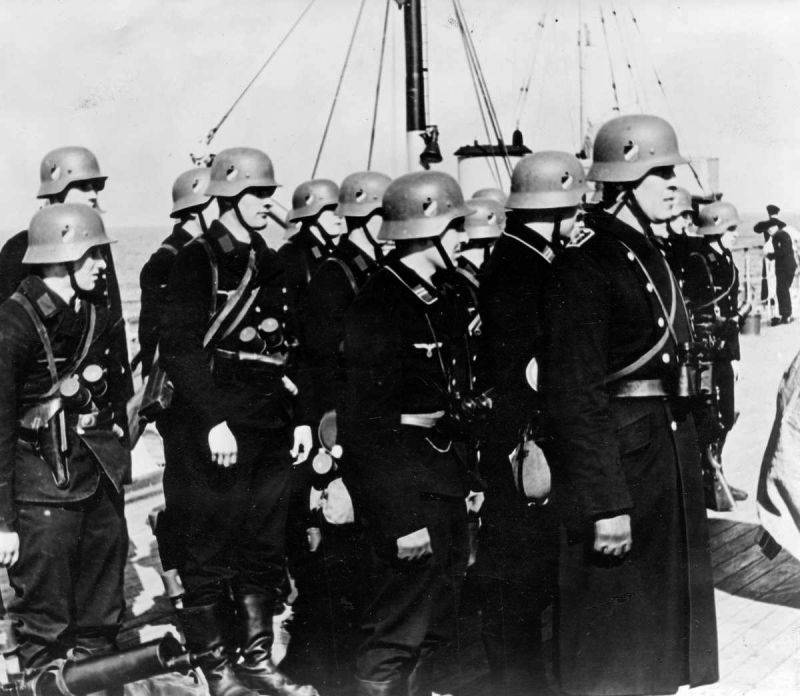
The assault group of German sailors on board the destroyer before landing in Denmark
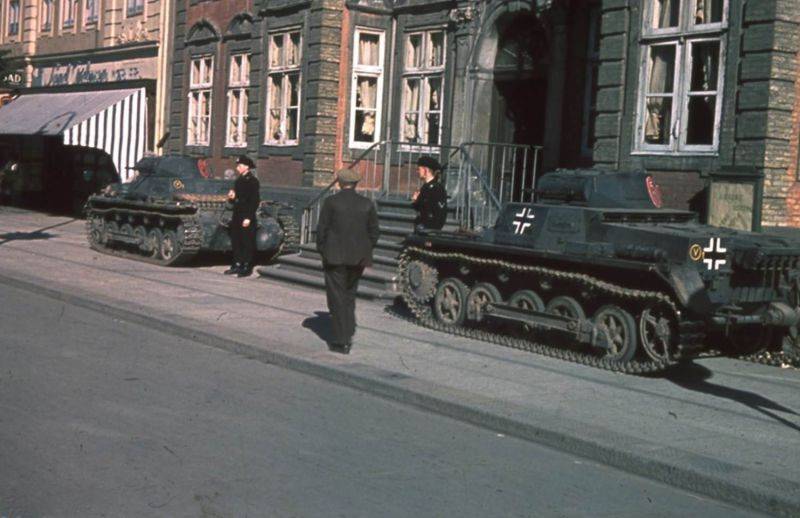
German sentries and tanks Pz.Kpfw. I Ausf. B at the entrance to the Jørgensens Hotel in Horsens
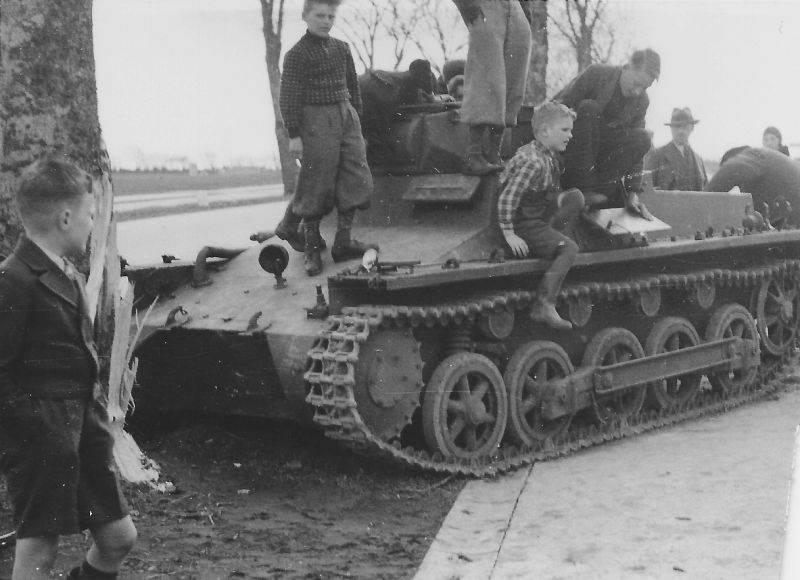
Danish children play on the German tank Pz.Kpfw. I Ausf.B, standing on the highway north of Haderslev
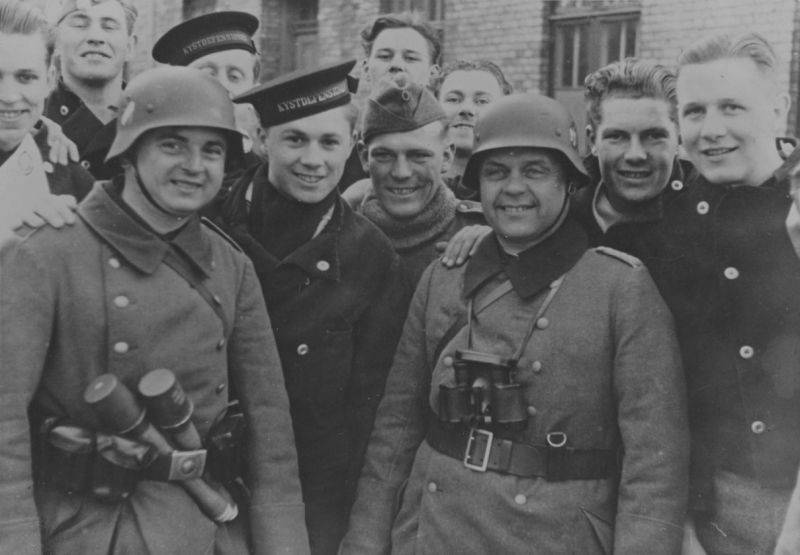
Danish sailors and German military on Copenhagen street
Target - Northern Europe
In preparation for the offensive on the French front, the armed forces of the Reich initially carried out an invasion of Denmark and Norway. Starting the war against militarily weak states, the military and political leadership of the Reich sought to solve several important problems. Scandinavia was an important military base. Berlin had to get ahead of England and France, who were planning to land troops in Scandinavia during the Soviet-Finnish war. After the defeat of Finland, the Anglo-French military-political leadership did not abandon plans to use the strategic points of Scandinavia. That is, Hitler wanted to get ahead of the Anglo-French forces.
The capture of Denmark and Norway blocked the sea passage to the Baltic for England. The capture of these two countries brought the German armed forces, primarily the fleet and the Air Force, to a flanking position in relation to the British Isles. Now, German ships and aircraft received good conditions for striking important sea lanes in the North Atlantic. The Reich received important ports and airfields, a strategic bridgehead for pressure on England and a future war with Russia. The Norwegian bridgehead could be used to attack the Soviet Arctic and block the sea routes in the Barents Sea. Germany also provided itself with important types of strategic raw materials, strengthening its military-economic potential.
In addition, it was important for Berlin by fighting in northern Europe to distract the Anglo-French command from the impending offensive in France, Belgium and Holland.
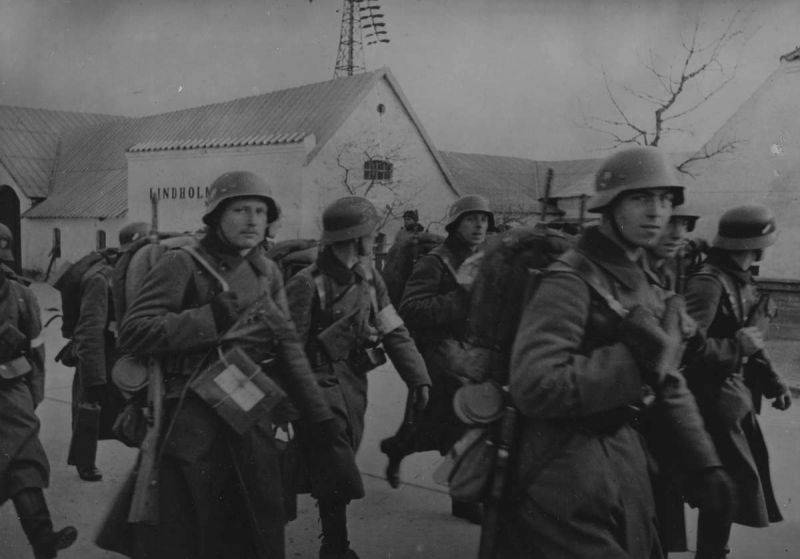
A group of Wehrmacht soldiers walking along the street of the Danish town of Lindholm
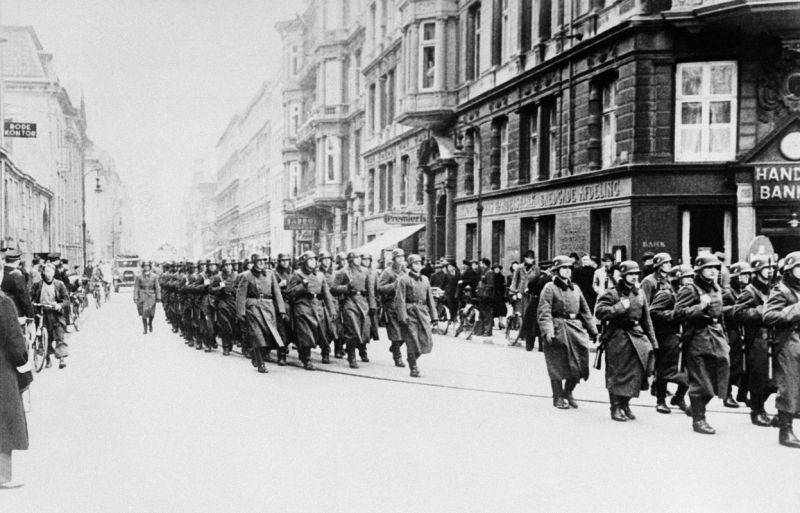
The parade of German troops in Copenhagen on the occasion of the birthday of Adolf Hitler. April 20, 1940
"Teachings on the Weser"
The development of the operation began in January 1940. In February, the headquarters of the 21st Corps under the command of General Nikolaus von Falkenhorst began a detailed study of the operation. It was Falkenhorst who carried out the Danish-Norwegian operation. The directive on the operation against Denmark and Norway was signed on March 1, 1940. It received the code name "Weserubung" (German: Fall Weserübung), "Teachings on the Weser" (Weser is a river in Germany, flowing northward and flowing into the North Sea). In order to achieve surprise, the attack on Denmark and Norway was simultaneous with the widespread use of naval and airborne assault forces. At a military meeting on April 2, Hitler appointed the day the invasion began - April 9.
Limited forces were allocated for the operation — 9 divisions and a brigade. They united in 21 army groups. The 21st Falkenhorst Corps operated in Germany, the 31st Corps of General Kaupish in Denmark. The German high command could not weaken the forces in the main western direction. Almost all forces of the German military and trade were to participate in the operation fleet: about 100 combat and transport ships, 35 submarines. The 10th Air Corps also participated in the operation: 500 combat and 300 transport aircraft. Aviation transported paratroopers and infantry, supported the fleet and ground units in Denmark and Norway.
The emphasis was on the surprise attack, the weakness of the Danish and Norwegian forces and the widespread use of the "fifth column", especially in Norway, where the Nazis were strong, led by Quisling. Denmark had only 2 divisions of incomplete composition, about 90 aircraft and a small fleet: 2 coastal defense battleships, 9 minesweepers, 3 mine loaders, 6 destroyers, 7 submarines. Norway had 6 small divisions, after partial mobilization they were brought up to 55 thousand people, the Air Force - 190 aircraft, the weak Navy - 2 coastal defense battleships, about 30 destroyers, 8 minesweepers, 10 mine loaders, 9 submarines.
In preparing the operation, the German command attached decisive importance to the factor of surprise. This was due to the fact that the lightning seizure of Denmark and the success of the landing and consolidation of amphibious assault forces at numerous points on the coast of Norway in the conditions of the complete superiority of the British fleet at sea could only be achieved if action was sudden. If the German ships and transports en route to Norway were intercepted by the British, who had overwhelming superiority at sea, the fate of the German Navy and the entire operation would not be decided in favor of the Reich. The risk was enormous.
The preparation for the operation was surrounded by strict secrecy. Hitler's commander E. Manstein noted: “None of the strangers knew anything about the plan for the occupation of Norway.” All events were to be unexpected for the northern states and western opponents. Preparations for loading onto transports were kept in secret, commanders and troops were given false destinations. The troops learned about the true destination only after going to sea. Vessels left the places of loading in small groups and with such a time difference that the landing, despite the different distances to their destinations in Norway, happened everywhere simultaneously. That is, everywhere the Germans had to attack suddenly. All military transports disguised as merchant ships.
In order to break the resistance of Copenhagen and Oslo, the Reich leadership gave the operation the appearance of a "peaceful invasion." False assurances were sent to the governments of Denmark and Norway that Germany wants to render the Scandinavian countries armed defense of their neutrality. The Danish and Norwegian governments had some information about the growing threat of a German invasion, but did not give them much attention. Countries were not ready for an enemy invasion. A few days before the start of the war, the Danish envoy in Berlin informed Danish Foreign Minister Munch about this. However, the Danish government believed that in the context of the war with England and France it was not profitable for Germany to start a war in Scandinavia. It was also considered in Norway. As a result, no early action was taken to repel the attack. Denmark and Norway were not ready to repel the aggression of a very limited group of the Wehrmacht. The British and French also missed the start of the operation. German ships and transports calmly reached the landing sites.
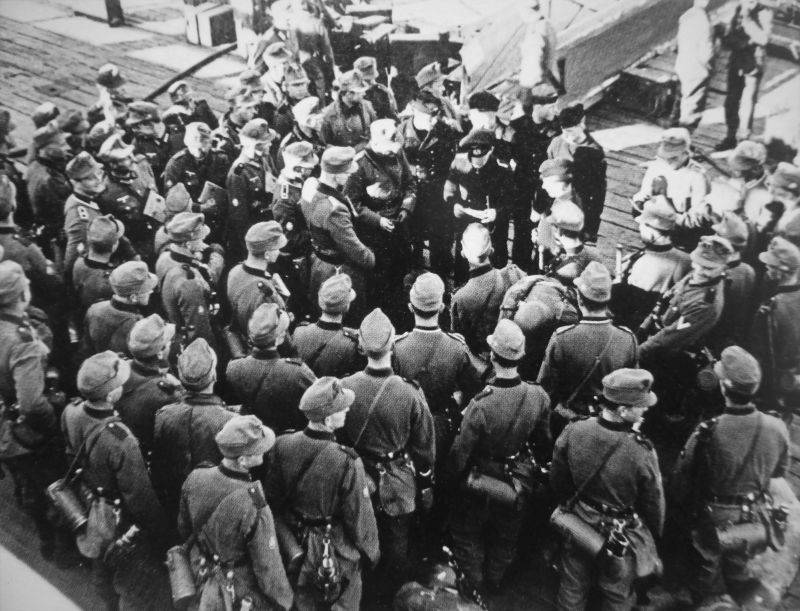
Soldiers and officers of the 138th Wehrmacht mountain ranger regiment in the port before loading onto the destroyer. The picture was taken before the landing of German troops in Norway
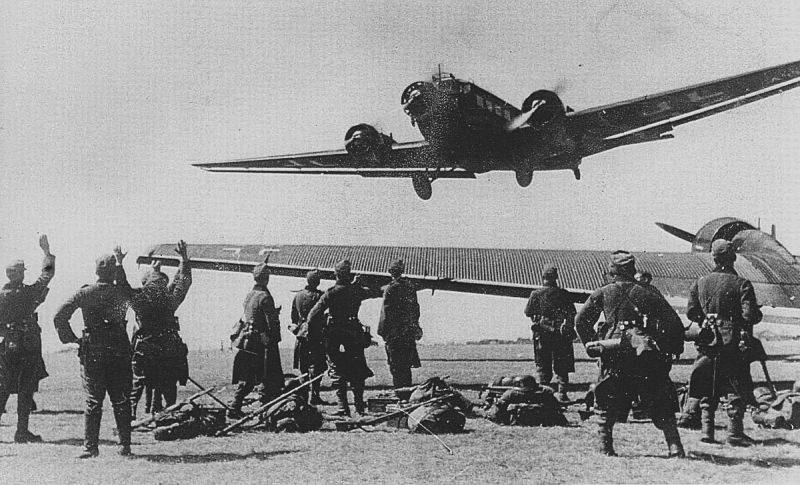
Transport carrier U-52, delivering reinforcements to units of the Wehrmacht in Norway, is landing
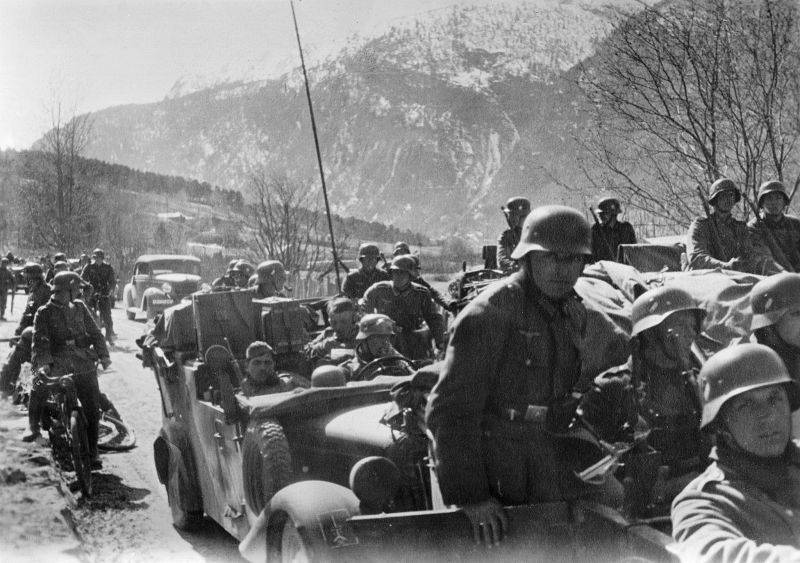
Wehrmacht motorized column moves on a road in Norway
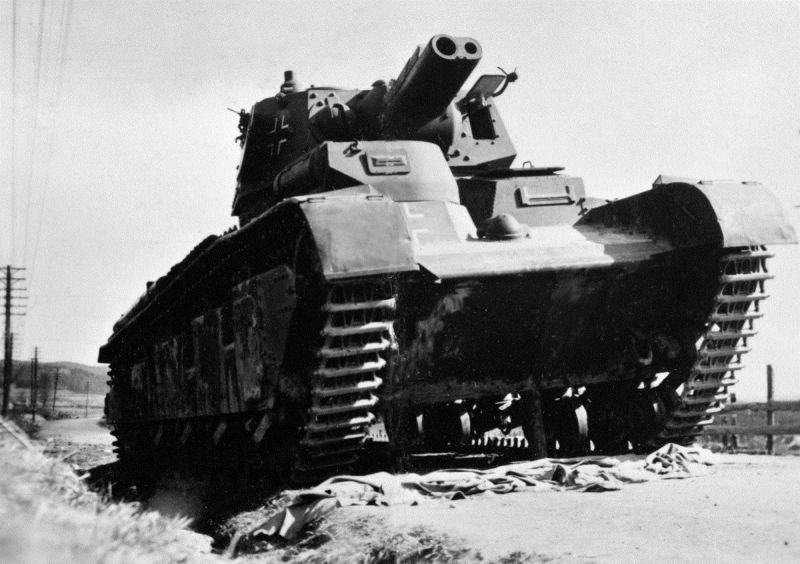
Damaged German Neubaufahrzeug multi-tower tank of the 40th Special Purpose Tank Battalion on the road in the Ringsaker area
The capture of Denmark and Norway
The Germans made extensive use of subversive and sabotage operations. So, when attacking Denmark, the Abwehr (military intelligence and counterintelligence) on April 9, 1940 conducted the operation "Sanssouci". German saboteurs penetrated the Danish border and captured a strategic target - a bridge across the Small Belt Strait. On the eve of the invasion of Norway, several German reconnaissance and sabotage units occupied important points on the coast and thereby ensured the landing of the main landing forces. At the same time, the "fifth column" carried out subversive actions in the country.
At dawn on April 9, 1940, the Wehrmacht invaded Denmark without declaring war. Only two divisions and a brigade took part in the attack. Small naval landings were landed. The Nazis did not meet resistance. Denmark lay under Hitler. The authorities themselves asked the population to refrain from any resistance to the Germans. The scale of the "hostilities" is evidenced by the fact that during the capture of Denmark, German troops lost 2 people and 10 wounded. Losses of the Danes - 13 people. It was an easy walk for the Wehrmacht. The Danish leadership de facto surrendered the country to the Nazis. Already on the evening of April 9, the Nazis were free to use communications, airfields and ports of Denmark for operations in Norway.
On April 9, the operation began in Norway. Ships and transports with landing parties left on April 3. The sudden landings of naval and airborne assault forces, the activity of the Quislingers broke the resistance of the Norwegian armed forces. The Germans very easily occupied the key port of Narvik. In the morning, a German landing force led by the destroyer Wilhelm Heidkamp entered the port, drowned the Norwegian armored carriers of the coast guard Eidswold and Norge. Then the German mountain shooters forced the Norwegian garrison to lay down weapon. The second German detachment, led by the heavy cruiser Admiral Hipper, successfully captured Trondheim. The third detachment captured Bergen. Stavanger was captured by paratroopers, which were reinforced by airborne infantrymen and anti-aircraft gunners. Soon infantry arrived at the ports. In the same way, the German Air Force, navy and infantry captured other cities and important points.
As a result, on the first day of the operation, German troops captured a number of important ports and cities, including the Norwegian capital Oslo. On this day, the German fleet suffered the greatest loss - when trying to break through to the Norwegian capital through the Oslo fiord, the heavy cruiser Blucher was sunk by artillery fire and torpedoes (125 crew members and 122 landing party members died). In the same battle, the German heavy cruiser Lutts was damaged. The Norwegian government did not capitulate. Separate units of the Norwegian troops, using a rugged terrain, offered stubborn resistance. There was a threat of prolonged hostilities and the arrival of allies to help the Norwegians. However, the resistance of the Norwegians was helped to break the local “fifth column” and the extremely sluggish and indecisive actions of the Anglo-French command, who was slow in providing real assistance to Norway.
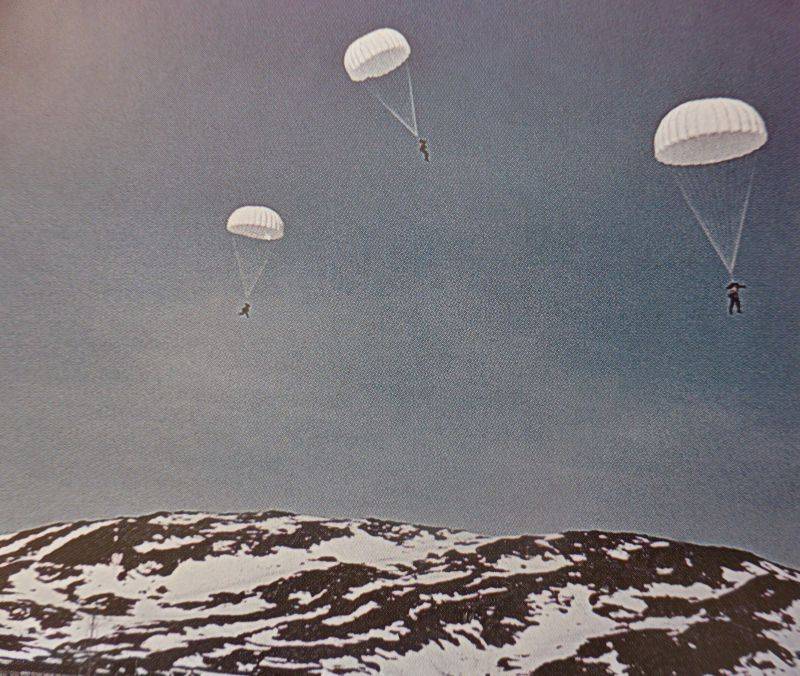
German airborne landing in the Norwegian city of Narvik
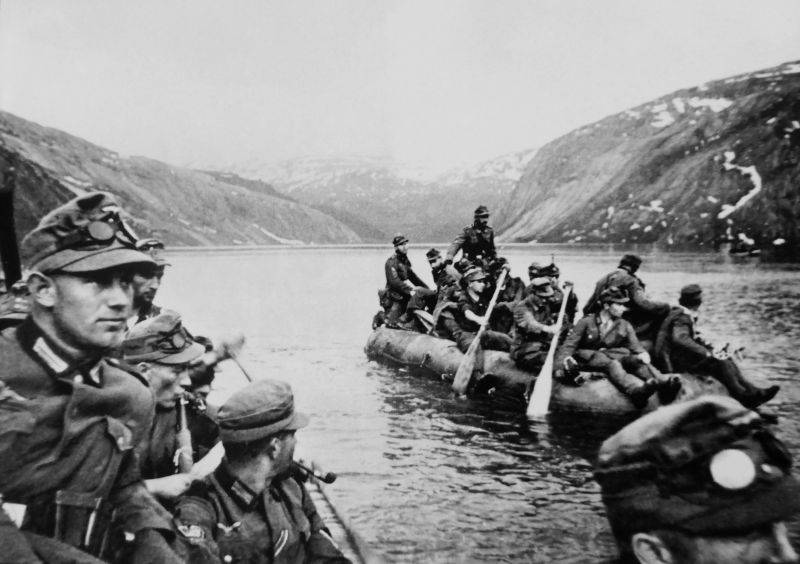
Wehrmacht mountain huntsmen (3rd mountain division) are transported by inflatable boats through a mountain lake near Narvik
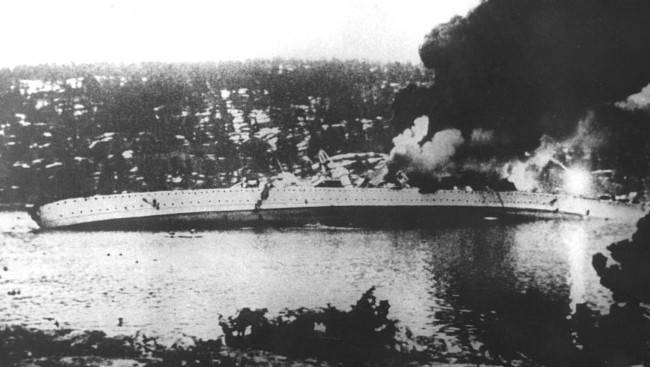
Blucher drowning in the Oslo Fjord, April 9, 1940
In fact, London and Paris only imitated Norway's help. She passed it, as before Poland. Soon they will also surrender France. The ruling circles of the “Western democracies” deliberately surrendered to Hitler most of Europe. They showed him that there would be no "second front". That the Germans can calmly end the Russians. Therefore, the British fleet "overslept" the movement of German naval landings. And then the allies did everything to provide “effective assistance” to Norway.
True, the British showed superiority at sea - on April 10 and 13 they defeated the German Navy in the area of Narvik. Thus, the British cut off the units of two German mountain infantry divisions located in Narvik, so the Germans were not able to develop an offensive in the north of the country at the beginning of the operation. By April 20, 1940, the Nazis occupied most of southern Norway. At the same time, some cities where the Norwegian units resisted were subjected to strong air strikes.
In mid-April, the Anglo-French command sent to Norway up to four divisions (English, French and Polish units). However, their attempts to develop together with the remaining Norwegian forces the offensive in central Norway ended in collapse. Unlucky allies acted in Northern Norway. So, in mid-April, the Allies launched an attack on Narvik, but they were only able to take it on May 28, and this could not change the general situation. The Allies acted inconsistently, mediocre, indecisively and slowly. British intelligence made one mistake after another.
The battle for Norway lasted about two months. The final outcome of the Norwegian campaign was predetermined by the Wehrmacht offensive at the French Theater. Anglo-French troops began to lose in the Netherlands, Belgium and France. On June 6-10, 1940, the Allies were evacuated from Norway in the Narvik area. The royal family, King Haakon VII, and the Norwegian government were evacuated from Tromsø on June 7th. On June 8, 1940, the German battleships Scharnhorst and Gneisenau sank the English aircraft carrier Glories and its escort (destroyers Akast and Ardent) in the Norwegian Sea. Killed over 1500 English sailors. The remnants of the Norwegian troops, left without the support of the allies, capitulated on 10 June. The Nazis occupied all of Norway.
The Germans seized a strategic bridgehead in Northern Europe, secured themselves from the north. Germany has strengthened its military-economic potential. The victory in Norway went to the Wehrmacht at a relatively low cost: 1317 people were killed, 1604 wounded, missing - 2375. 127 aircraft, about 30 ships and ships were lost. The Norwegian army lost 1335 people killed and missing, up to 60 thousand prisoners; the British - 4400 people, the French and Poles - 530 killed.
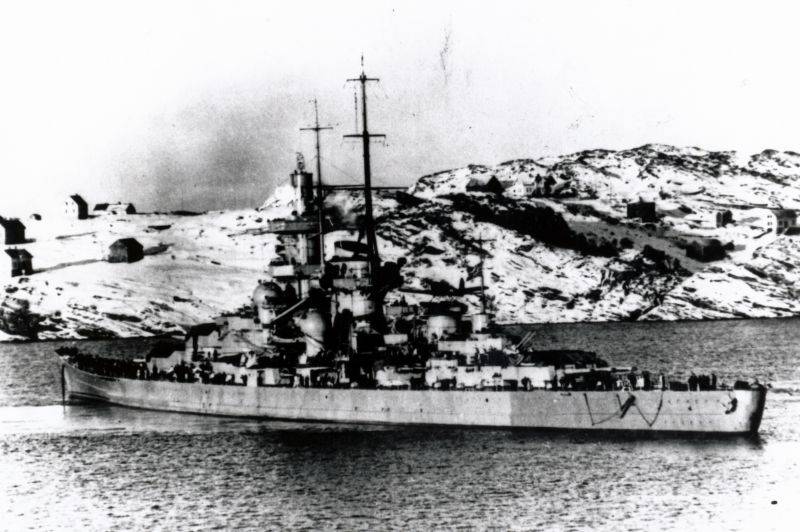
German battle cruiser Gneisenau anchored in the Norwegian fjord
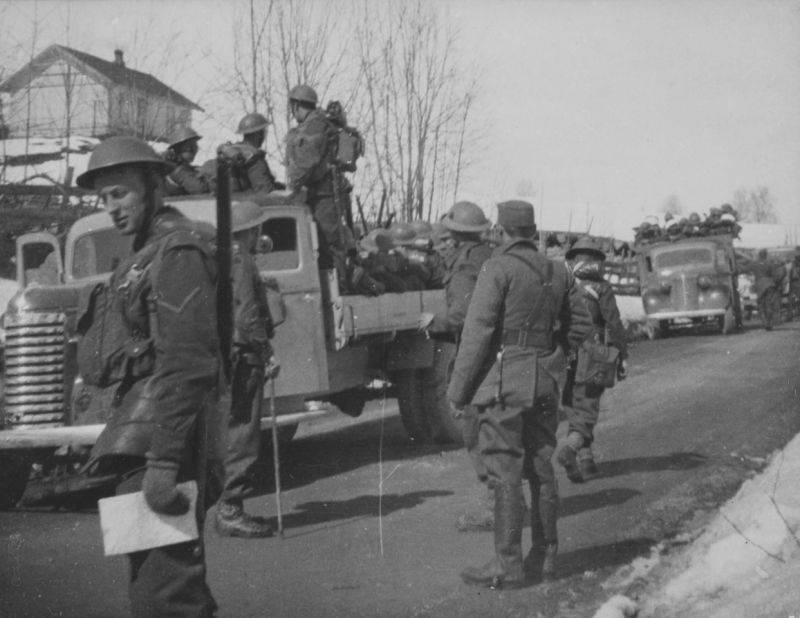
Trucks with British soldiers on the street of a Norwegian village
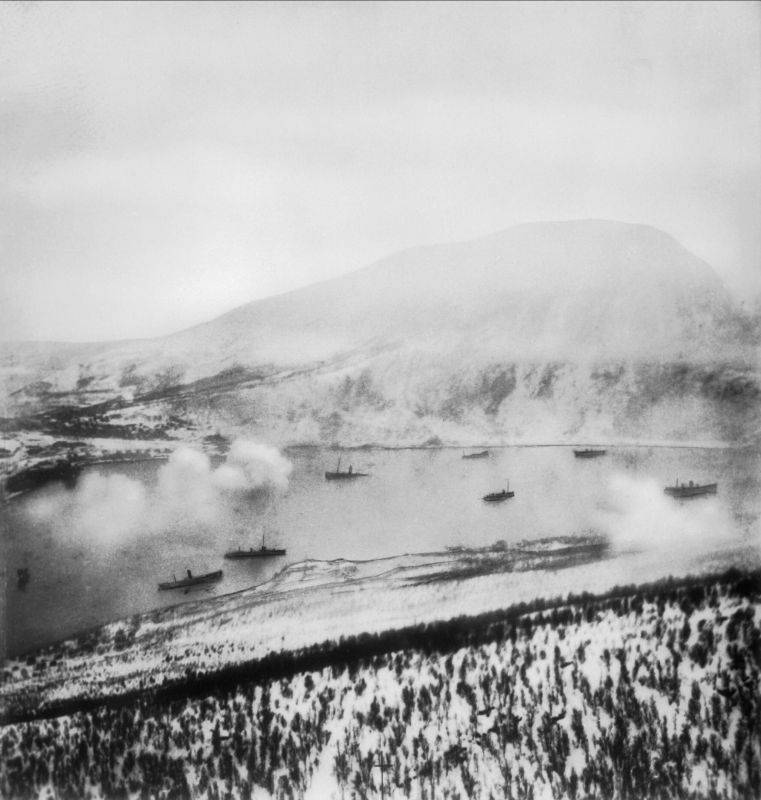
The skeletons of the destroyed German supply vessels in the harbor of Narvik after the attack of the British 2nd destroyer flotilla on April 13, 1940
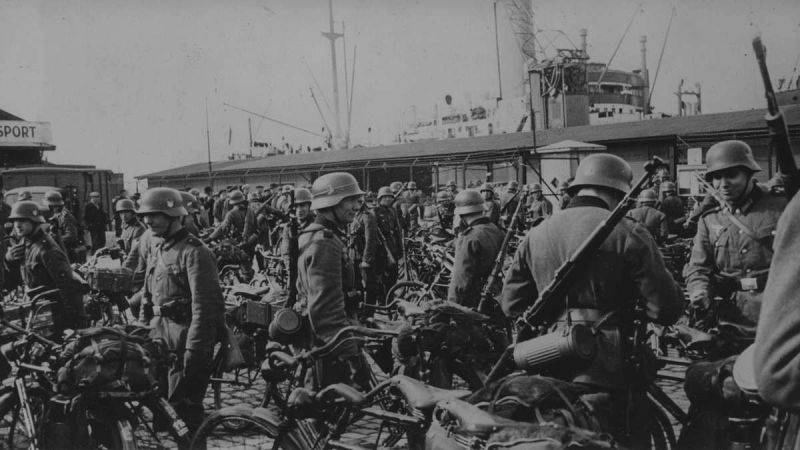
German cyclist soldiers after landing at the port of Oslo
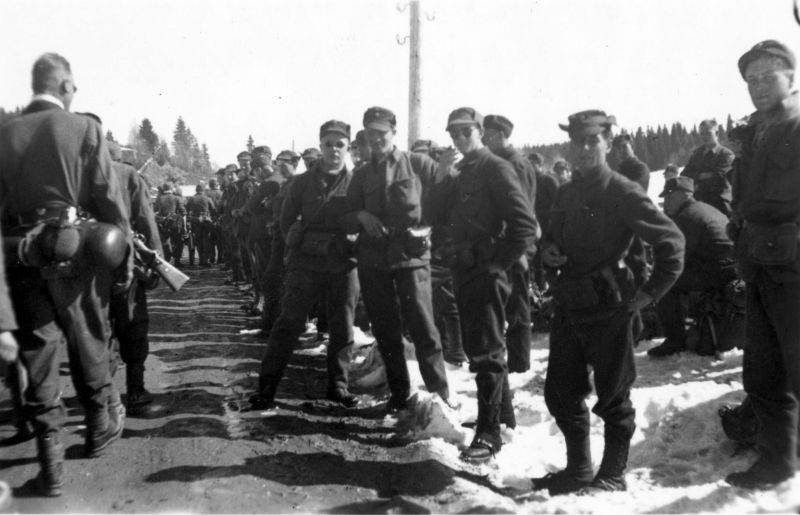
Captured Norwegian soldiers by the road in Kwam, surrounded by Wehrmacht mountain rangers
- Alexander Samsonov
- http://waralbum.ru/
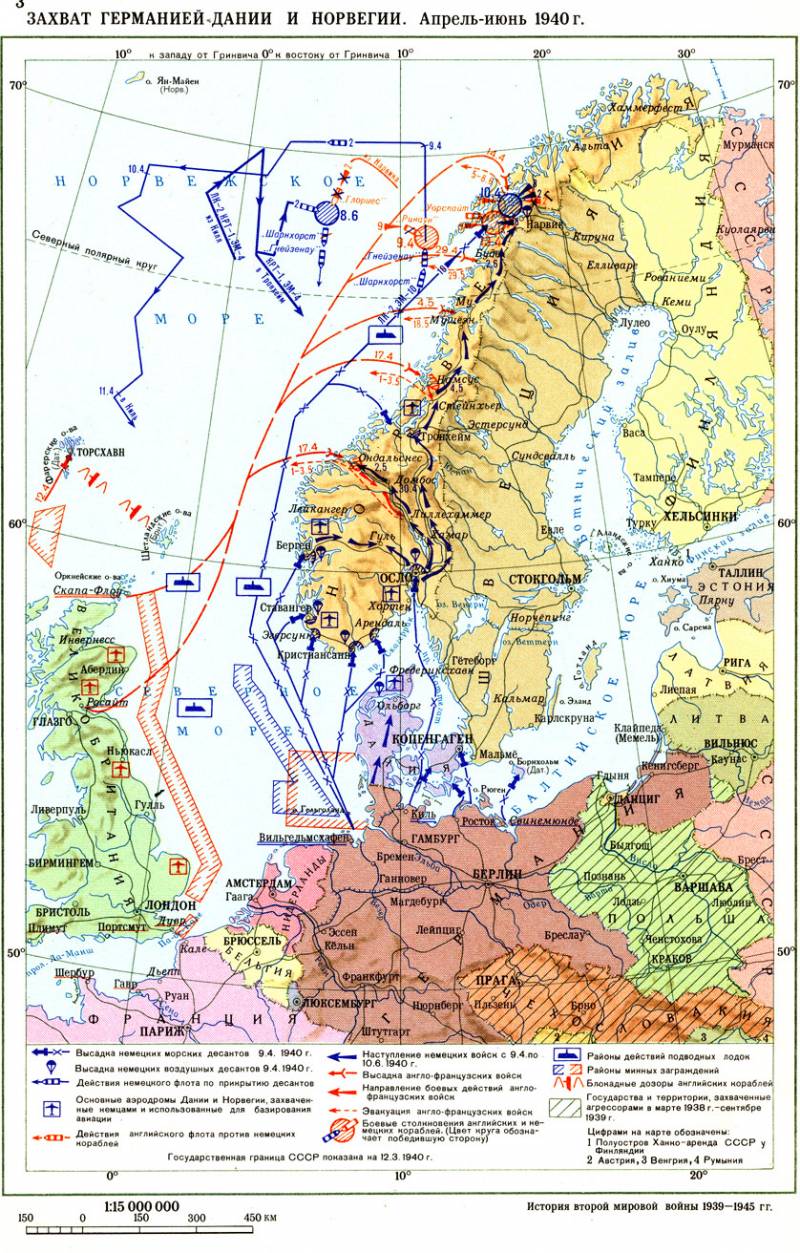
Information